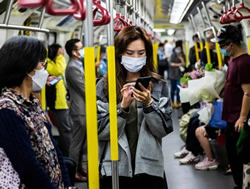In the early stages of the COVOD-19 pandemic Hong Kong was seen as leading the way with its successful counter-measures. Now it is grappling with second and third waves of infection. Helier Cheung* reports on what went wrong.
 Until recently, Hong Kong was considered a poster child in its handling of the COVID-19 pandemic.
Until recently, Hong Kong was considered a poster child in its handling of the COVID-19 pandemic.
Despite sharing a border with mainland China, where the first cases were reported, Hong Kong kept its infection numbers down and was able to avoid the extreme lockdown measures introduced in parts of China, Europe and the United States.
Now it’s been hit by not even a second, but a third, wave of infections.
The Government has warned its hospital system could face collapse, and it’s just had a record high number of new infections in a day.
What went wrong, and what lessons are there for countries juggling both the pandemic, and the economic pain caused by lockdown?
Hong Kong had its first cases in late January, but infection numbers remained relatively low and the spread was controlled.
It experienced what became known as its second wave in March, after overseas students and residents started returning.
It introduced strict border controls, banning all non-residents from entering its borders from overseas.
Residents who returned were required to undergo a test and 14-days of quarantine.
It even used electronic bracelets to track new arrivals and make sure they stayed at home.
It also worked. Hong Kong went for weeks without a locally transmitted case, and life seemed to be heading back to normal.
So how did the third wave arrive?
Chair of Virology at the University of Hong Kong, Malik Peiris believes there were two flaws in the system.
First, many returnees opted to quarantine for 14 days at home — an arrangement that’s common in many countries — rather than in quarantine camps.
“There is a weakness there because other people in the home are not under any form of restriction, and will still be coming and going,” Professor Peiris said.
However, he believes the more serious problem came from the Government’s decision to exempt several groups of people from testing and quarantine when they entered Hong Kong.
About 200,000 people were exempted, including seafarers, aircrew and executives of companies listed on the stock exchange.
“It said the exceptions were needed to ensure normal daily operations continued in Hong Kong, or because their travel was necessary to the city’s economic development,” Professor Peiris said.
The Government initially said that the quarantine exemptions were not to blame, but later admitted there was evidence that the exemptions were behind the latest outbreak.
Hong Kong’s quarantine exemptions have been around for months, but the third wave didn’t hit until July.
Professor Peiris believes another reason behind the third wave was the rollback of social distancing measures in June.
“Many citizens were fatigued after months of social distancing, so when the Government said things seemed fine and relaxed restrictions, they started meeting with friends and family,” he said.
“As long as social distancing measures were in place the system could cope, but once measures were relaxed the imported infections spread rapidly. It’s a lesson for everybody.”
*Helier Cheung is a writer and editor for BBCWorld having previously reported from Hong Kong, Washington and Singapore.
This article first appeared on the BBCWorld website.


